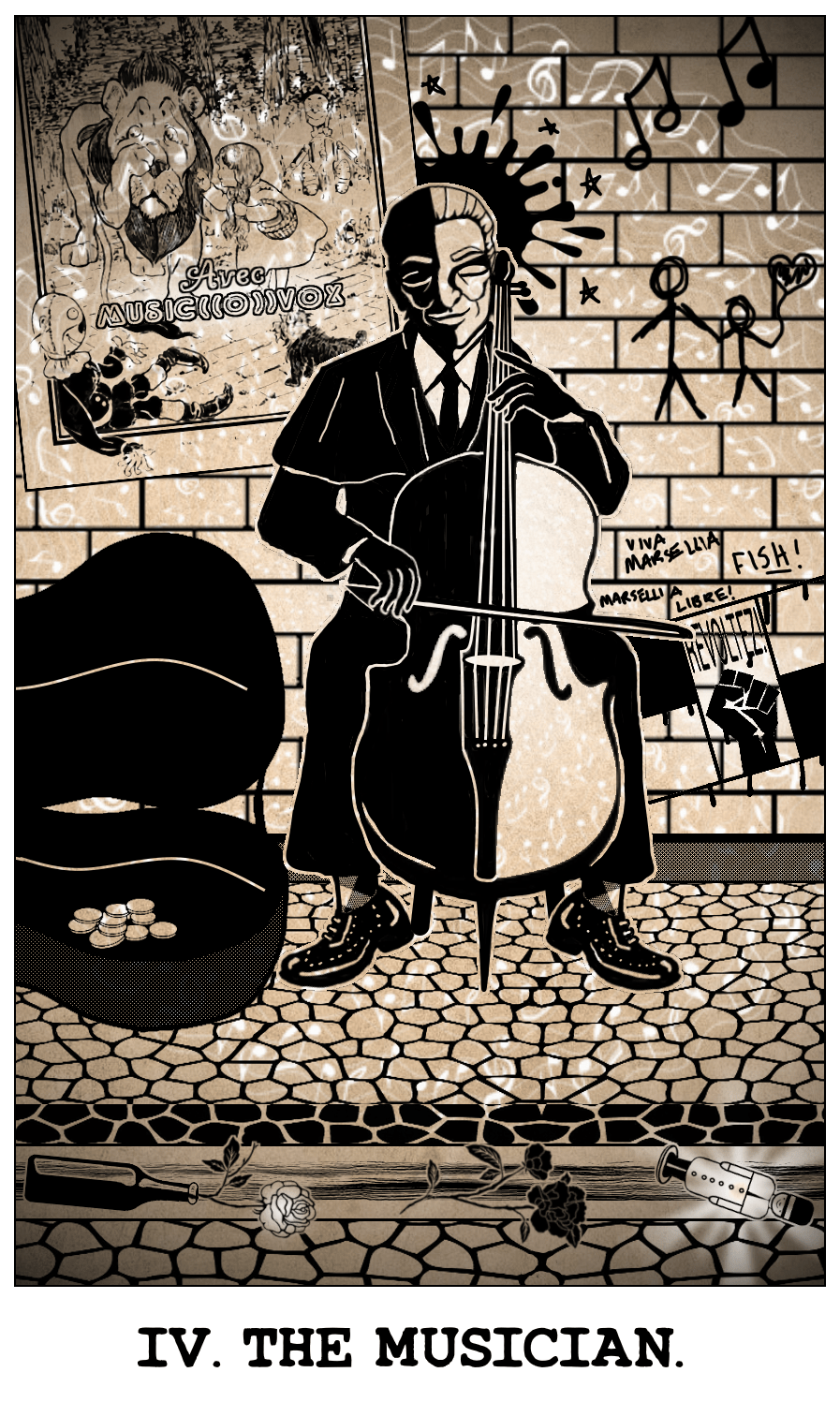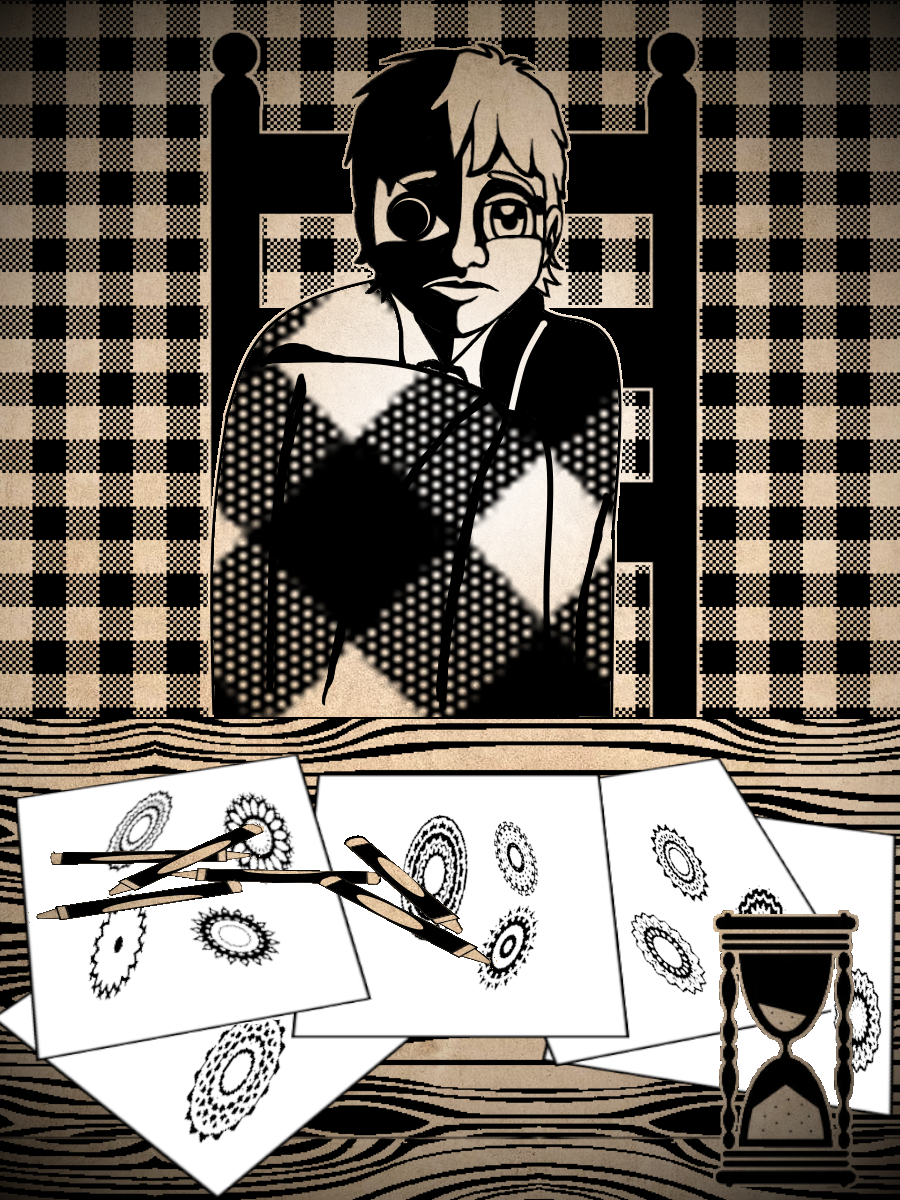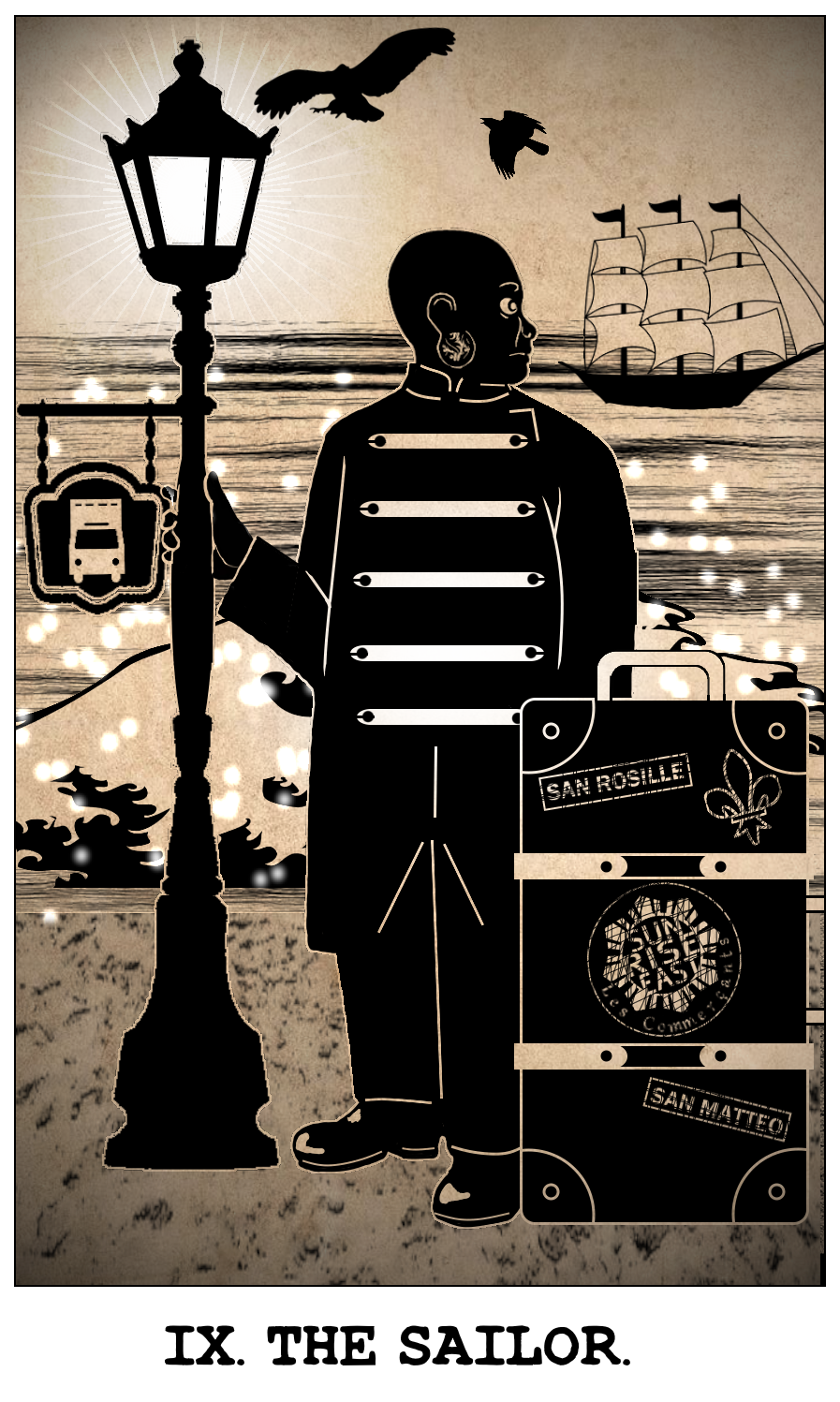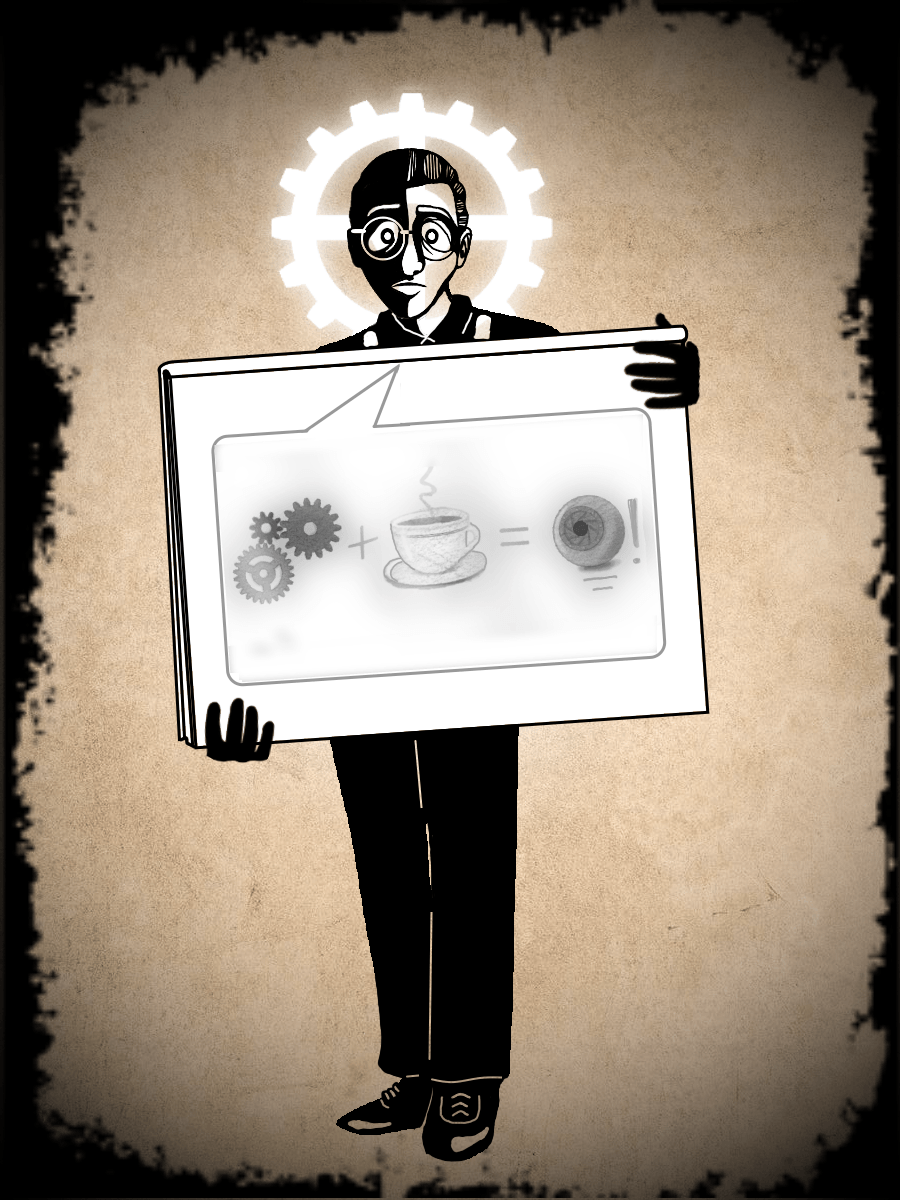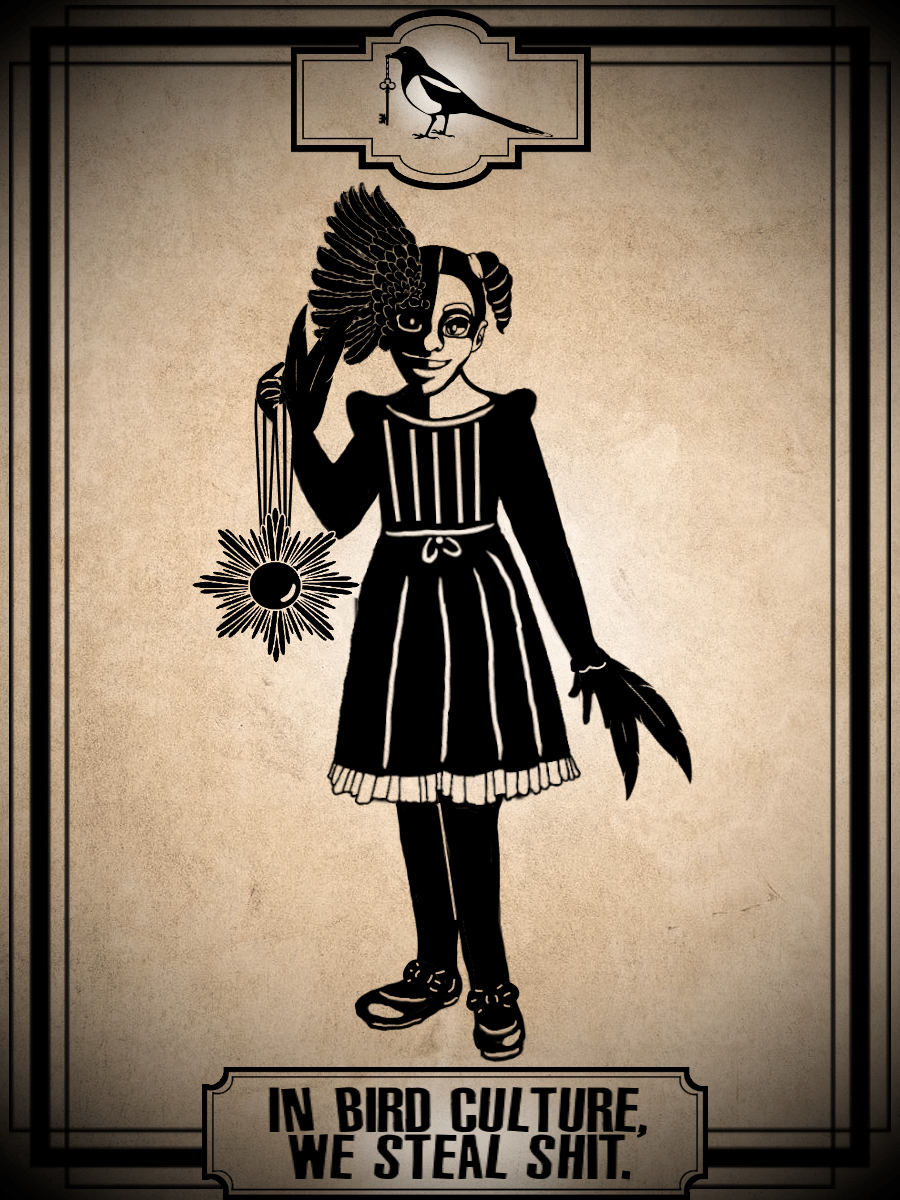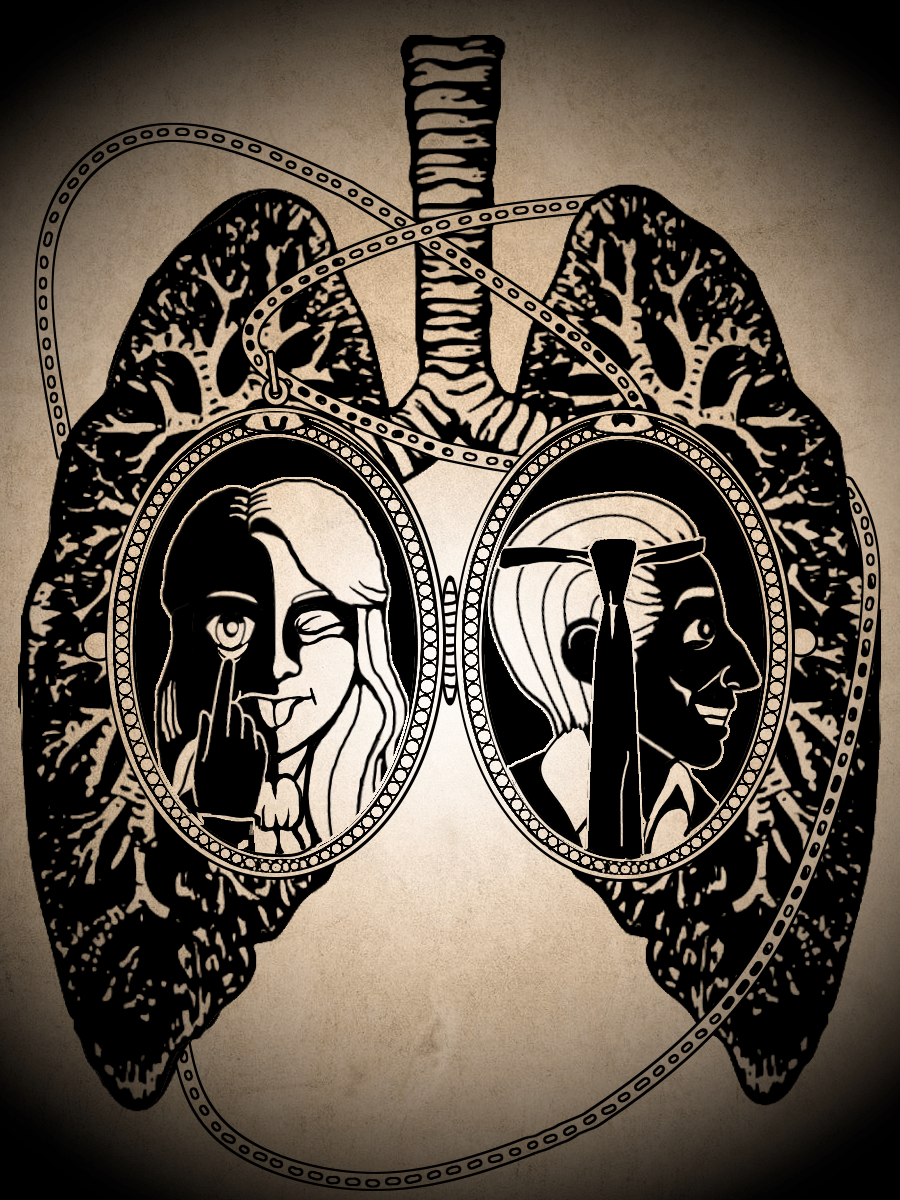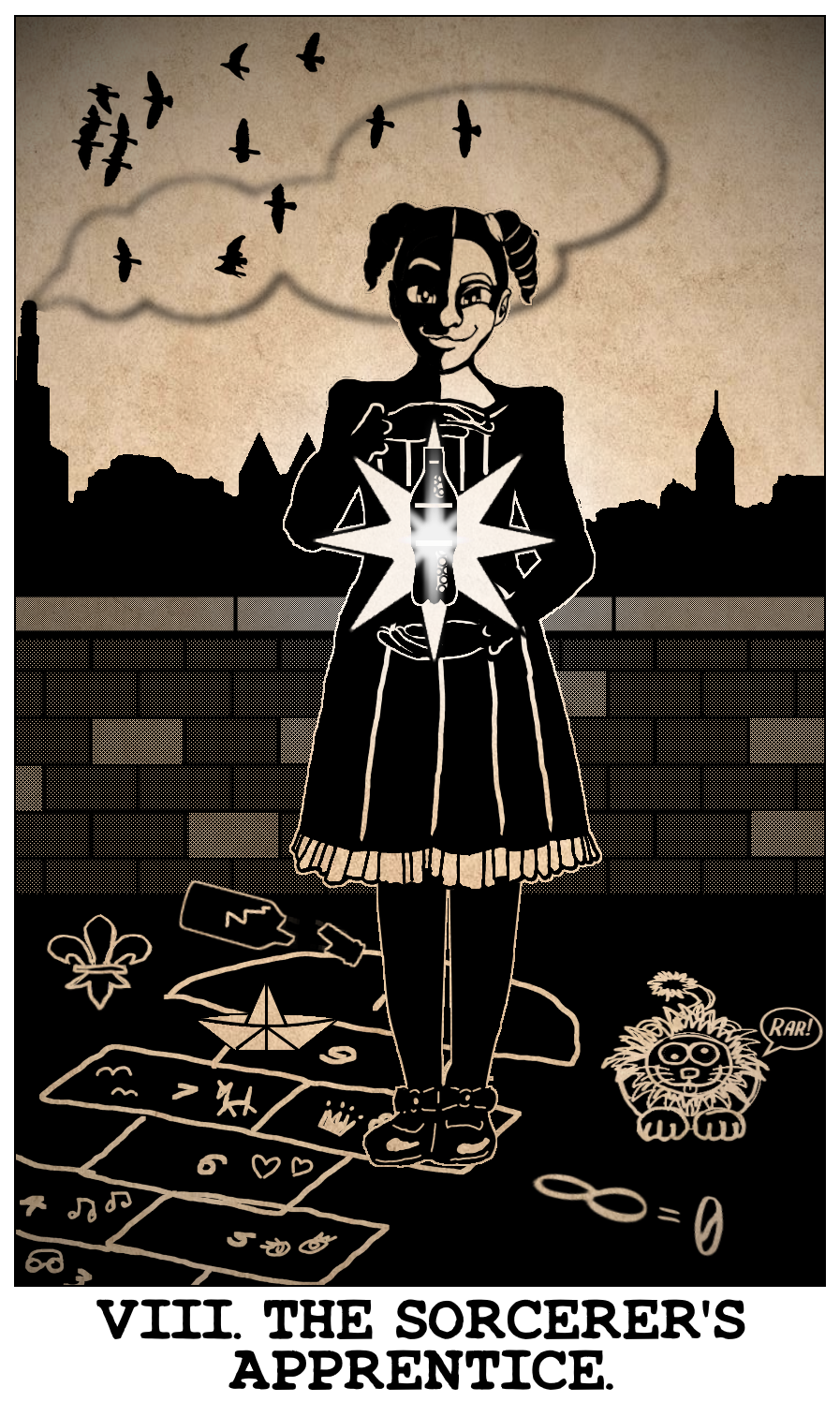The red man was carrying the green child and running. The boy was swaddled in a dark cloth coat. The blood did not show, but the slow seep of warmth was steadily growing.
The chaos was behind them. If they were fast and quiet, they would not be stopped. Even if it were someone meaning to help and not question, they must not stop. The only help was before them, and they must not waste time explaining.
If the police were to stop them, that might mean a cell. That would be death for the child.
The boy was crying, which drew glances, but the man allowed it. When it seemed the low, sawing noises would cease, he clutched the dark bundle against him and pleaded, “Don’t stop crying. Don’t stop crying.”
When they passed a trash can, the man would shift his burden and rifle through it. In such a manner he had found two soup cans, a bent brass tack and a broken link of chain. It was not good.
They were passing a wrought iron fence, chest-height, with jagged arrow points. Beside the gate on either side was a golden final, shaped like an eagle with wings outstretched. The man gave a cry and snatched at it with his bare hand, as if it might perhaps be loose. It wouldn’t be gold, it might only be painted iron, but they would need the iron. It might even be brass.
There were some loose cobbles in the gutter at the edge of the street. The man chose a large one and, juggling the child against one hip, brought it to bear against the eagle’s back. The metal rang, but did not dent or give. With tear-streaked desperation, he struck the eagle again and again.
“Move!” he hissed, too short of breath to snarl.
“Oi, magician!” a man called. “What are you doing there?”
Damn it!
He dropped the stone, bundled the child against him, and ran.
The boy had stopped crying.
The streets had grown narrower, more circuitous, more familiar. The lamps were fewer. The decorative municipal trash cans, which resisted theft and access, were nonexistent. There was an occasional dumpster — but he didn’t have time for those! The alleyways were known and numbered, between boarded storefronts and cheap, converted gothic-style houses. Five more. Four more.
Home was near. There was always some metal at home, though never much and never for long. Hyacinth was near. Help and safety.
But the boy had stopped crying and none of that mattered.
He stopped, tottering, and leaned against the crumbling brick façade of a bombed-out building. His breath was tearing in his chest. He thought something inside of him had sprung, but that didn’t matter either.
He peeled back the folds of the coat, revealing the child’s face, pinched and pale. He was only green in patches. The blood had dyed his skin, as it had reddened and matted his hair. Head wounds bled a lot, and the man had seen terrifying gashes put right with just a little mending and rest…
But here, beneath the running red, was the white of bone, and it was shattered.
“Cry,” he said.
Silence. He could not hear breathing over the sound of his own, and the child’s tense expression was going slack.
“Cry!”
But nothing. Such a roaring, loud sound of nothing.
He held the precious, fragile parcel away from him, turned it in both hands, and shook it. The child’s ruined head bobbled on a flower-stem neck.
“Damn you! I said cry!”
A low, miserable sound rose from the bloodied mouth. One hand came up, green but stained and pale and shaking.
“It’s all right,” the man said. He clutched the hand, and he pressed it to his lips. “It’s all right.” He bundled the body against him and ran on.
◈◈◈
The house was narrow, tall, and jagged.
The roof was naked tar paper, with only a few errant shingles left on in scabrous patches like some kind of disease. A large hole had been covered with a tarp, which was weighted on the edges with loose brick and stones. It billowed in the wind.
The house itself, and the battered fence that separated the yard from the street, was of mortared construction, with varied components. Red brick here, brown here, flagstone, brownstone, cobblestone. There was much evidence of damage and patching, and very little paint.
Some small forgotten windows were broken and boarded, but most had been reglazed with lead and scrap glass and putty. Nails were too precious a commodity to be wasted on boards, and the daily shocks that knocked out glass and shattered walls had long since ceased.
A wooden sign affixed to the brick wall beside the front window offered rooms to let, and a smaller sign beneath this rescinded the offer from people with dogs, or perhaps simply dogs alone.
The courtyard, pressed small by close-knit buildings and wide street, was full of scrap. Mostly torn and splintered wood that would be burned in the brick oven and terracotta braziers for warmth. There was some loose brick heaped in little piles, meant for further repairs, and some glass which would likewise be pressed into service as needed. A single sack of dry cement sat forlornly against a slumped brick wall, awaiting a trowel that lasted long enough to be put to proper use.
Paper trash, constant and ephemeral, drifted in and out at the whim of the breeze. Bird droppings, though unavoidable, were not of squalid amount. Rats were similarly sparse. The local cats kept these populations in check, as well as the local humans — who were not too picky about what went into the soup. An occasional cat or dog still found its way into the pot as well, as once had the elephants from the zoo.
There was no gate. A largish board, leaned at a gentle angle and weighted with rocks, served the purpose. A scrap of garish poster, showing a laughing dancer with a flute of champagne, still clung to one side.
Mordecai planted his foot in her face and trampled over her. He was gasping and could only manage a stagger. It would not have been wise, or even possible, to run through the yard. He was still going too fast for it, and he tripped and scraped open a knee before he made the steps and clambered up to the door.
The doorknob!
He reached for it with feverish hope, but found it gone. A string had been threaded through the resulting hole, through a neighbouring hole in the door frame, and tied in a limp little bow.
He made a low moan, he could not manage words, and sank down to his knees. The child slid from his arms, into his lap. He couldn’t reach up and undo the string. He had no strength for it. He had no mind for it.
There was no cord to pull, no buzzer or bell to ring.
Hy…
It was a breath. Too soft.
Cin… Hya…
Please help me, I’m going to die out here!
No, he wasn’t going to die. Or if he was, that part didn’t matter.
“Hyacinth!”
Ah.
He felt that. Like the pluck of a high string. He was broken, or breaking. It hurt to breathe.
He heard her shoes on the tile floor. Rubber soles, glued and stitched, soft things. Quiet things, they whispered on the tile, staccato fast. She was running.
She broke the string.
Oh, I could’ve done that, he thought faintly.
“Mordecai, what in the hell?” She had been working in the basement, leading a new window pane. Faint yellow wisps were already escaping the elastic that tied back her hair, but everything else about her was trim, tucked and plain. Her skin was tanned and had a tendency to pinken, but she had no colour. Her magic was learned.
She lifted the dark amber goggles up to her forehead and swiped at a smudge on her nose with a gloved hand.
It was hard for him to speak. He brushed back the coat and he lifted the child.
She swore, then she snatched up the boy and disappeared within.
He told his crumbling body to get up and go after her.
He had managed the getting up part, at least he had pulled himself into a crouch, by the time she came back and dragged him all the way to his feet. She let him go. He slumped against her while she jammed both hands into his pockets and felt around. There were some spare strings in the vest. She threw them down.
“Do you have anything? Coins?”
“Coat,” he managed. “In the coat…” She left him again. He stumbled after her. The tile floor was cracked and loose and treacherous.
The front room was wide and bright, with a sweeping staircase. It had been intended as an atrium. The skylight had been removed in a rather spectacular fashion. The tarp closed the space above. The kitchen was behind, through an open doorway that had been cleared of both door and hinges.
Metal, what there was of it, tended to collect in the kitchen, and the large window and broad table made it fit for a surgery.
There was a hopeful clatter, then a cry. “Oh, you useless son of a bitch!” She turned to glare at him. “Tin?”
There was a ladder back chair with a raffia bottom. He collapsed into it. “Both?” he said. “Tin? Both tin?”
“Both tin!”
“I hoped… steel…”
“Don’t you know the difference? Not even by now?”
He shook his head, ashamed. “All I could find.”
“Why don’t you have coins?”
“I left it,” he said. “I left everything. I ran.”
He thought of the case, open and inviting. There would have been coins. If he had gone back for the case, there would have been coins. Nickel, and copper. Strong metals. Good coins.
“I’m sorry.” He began to weep.
“Stop it,” she said. “Is there anything else?”
“Brass tack. Chain link. Iron. Look.”
She rifled the folds of the coat and found what he had told her. She was already shaking her head. It wasn’t enough.
“I have iron,” she said. “I have most of a frying pan. But I need bone!”
“The tin…”
“Tin is soft! I can’t even make staples with tin. I’m not going to make a skull.”
“Just for right now…”
“It’s not just for right now, it’s for the rest of his life!”
She closed her eyes, trying to banish the image of it. He wouldn’t live long that way, and every moment would be such pain. To prolong life, the mere existence of life, at the expense of everything else that living was supposed to be about… That was not her purpose.
This child, practically her own child, was lying on the table, bleeding and dying, and she could save him, but not like that.
Mordecai stood suddenly, upending his chair. “Use what’s in me!”
“No.”
Her thoughts were elsewhere. There were still nails in the house, in the walls, some in the roof, but it would take too long to gather them all, and it might not be enough. Most of them would be iron and not steel, anyway. That was why they were still in the house, and there they were liable to remain.
“There isn’t anything else and it has to be right now! Use what’s in me!”
“That would kill you.”
…They hadn’t replaced the doors on the pay toilets in Strawberry Square yet. The storage building across the alley might’ve replaced the locks, but what would she do if she took the time to look and they hadn’t? The General might’ve been holding back some medals, but that was the same problem — time lost for uncertain results.
Erik might slip away if she left him and ran upstairs just to explain. Mordecai certainly couldn’t…
He snatched her and shook her. “I don’t care!”
“I know you don’t care,” she said. “That’s why I’m the one telling you no. I don’t kill people.”
“You’re killing him now!”
She shoved him away with a snarl, “And you’re helping to kill him! I am trying to think!”
He staggered back from her and sat down on the floor. She ignored him.
Tin. What can I make with tin? I have iron, but that doesn’t go. Lead goes with tin, but that’s poison. Copper goes with tin, but I haven’t…
She tweezed the tack between two fingers and held it before her eyes.
I have brass. I have a little bit of copper. I can pull it apart.
A little bit of copper was enough for an alloy, but not by itself.
Oh, please, tell me I still have some. I think I still have some.
“Mordecai, get me my bag.”
“What?” said the man.
“Get me my doctor bag, you weird, stupid man! It’s big! It’s black! It’s on the counter! Get it!”
She stripped off both gloves, pulled down her goggles and began to mould the brass tack in her bare hands. It glowed a dull red that rapidly brightened.
She felt more than saw the make of the metal. She understood it. Separating the parts of an alloy was sometimes simple, like slipping a single strand out of a braid, and sometimes more difficult, like pulling apart two books whose pages had been interlaced. You couldn’t just yank them apart, they had to be undone.
Brass was not quite so complicated, and there was so little of it. After a brief, bright flash, the filament of copper between her fingers was already dim and cooling when the dark leather bag thudded down on the table beside her.
Mordecai was panting. He sounded like an ancient bellows. She was going to have to mend him too. That would require gold. But that would be later.
She laid the copper thread on the dark fabric of the coat, where its shine would be easily seen, then she delved into the bag with both hands. There were medicines in here. Sulfa. Morphine. Iodine. Tablets and powders and syrups. But there were also metals, fine powders corked in bottles, too delicate or rare to be used on their own. Most were silver, of various textures and shine.
A paper label showed her scrawled block letters in black ink that was fading purple: ANTIMONY. There was nearly an ounce of it.
“That’s poison,” said Mordecai. The bottle was ridged, so you would know it by feel.
“It’s just not good to breathe it.”
This was mostly true. But a little bit of poison would be better tolerated than a broken skull, even for the rest of his life. “I want you away from here,” she said. “Go back where you were.”
He stumbled, but he successfully navigated the distance. He couldn’t pick up the chair. He sat down beside it. The floor was cold. “You’ll fix him?”
“I’m fixing him. Don’t look at the light.” She heard him weeping.
It didn’t matter.
There was no need to disinfect, not the wound nor her hands nor the surface. The heat of the process would kill anything bad. She did pull down the coat, so that the sparks wouldn’t catch it on fire. She yanked open the boy’s shirt, scattering the buttons, and pulled that down as well.
His body was dented with red marks that were bruising. There was a sharp divot in his side that was surely the broken rib she had felt in him. He shifted and moaned. She winced. She had hoped he wasn’t conscious enough to feel those things for himself.
“Erik, if you can hear me, I’m not going to hurt you. It’s going to smell funny and it’s going to feel hot, but that’s all. I’m going to cover your… your eye.” There wasn’t much left of the other one to protect. “Don’t open your eye.”
She secured a gauze pad with a strip of tape, then dampened it with a spray of water from a bottle. “Okay. It’s going to be okay.”
Mordecai drew his knees to his chest and buried his head in his arms, hiding like a child.
The light was bad, the particular quality of light that resulted from the merger of body and other, but the smell was the worst. Hot metal and burning flesh, and burning bone. He never got used to the smell.
Memories rose of twisted bodies and screaming mouths. The medics rushing down the aisles of the infirmary with dark bags, patching gaping holes and replacing lost parts with whatever material they favoured. Metal, for some of them, like Hyacinth. Stone, for others, or plant matter. The worst of them used flesh, and they would flense the bodies of the dead and sometimes the dying to save others who might live.
Such unforgivable acts had pushed all magic-users to the fringes of society. The ones who could hide it, the learned users, did. (Barring certain eccentrics who still practised their trade.) The innate users, who showed their proclivity in their coloured skins, could not. They were ostracized, marginalized, forbidden housing and employment.
Given half a chance, they would be beaten.
They were kicking him.
He curled up tighter and tried to hide from the thought.
They weren’t trying to help him. He was hurt and they were kicking him.
And they were laughing.
He had done something to them. He didn’t know what. His own ability was hardwired but (he had thought) weak and harmless. Something had come out of him that was loud and bright. It had made them go away from the child and he hoped it had hurt a lot.
He hoped, also, that it wouldn’t follow him back here, but that was much less likely. Whatever it had been, it wasn’t subtle, and the crowds would have seen a red magic-user running away from it. It was not unknown that magic-users lived in the broken-down house on Violena Street, all kinds.

